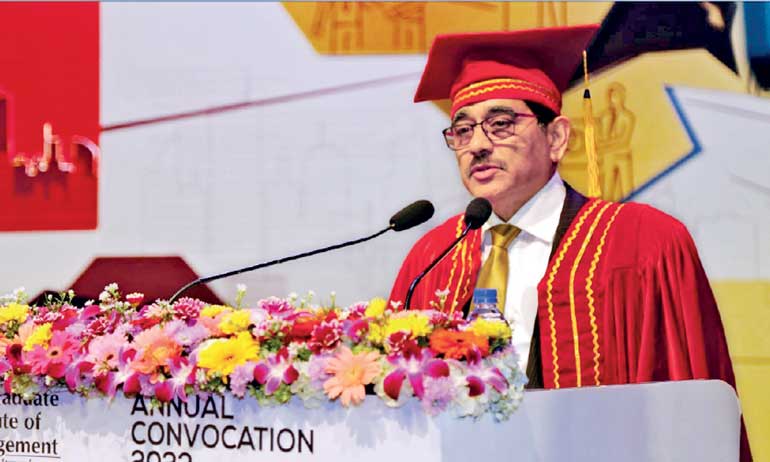Monday Feb 16, 2026
Monday Feb 16, 2026
Tuesday, 6 December 2022 01:48 - - {{hitsCtrl.values.hits}}

Dr. Nandalal Weerasinghe delivering the convocation address

It was refreshing to witness the “thought leaders” in action amidst a socio-economic crisis fuelled by the absence of right leaders. The Postgraduate Institute of Management (PIM), the only dedicated state-sector higher education entity in the business of “leader breeding” had its largest even convocation recently. It had an apt theme, “The best fly above the rest.” Today’s column focusses on the keynote speech delivered by Dr. Nandalal Weerasinghe, the Governor of the Central Bank.
Overview
“I congratulate the Postgraduate Institute of Management of the University of Sri Jayewardenepura for being a pioneer in giving stewardship developing young business leaders of the country with global presence and a local pulse,” so said the Governor in commencing his speech. Equipped with a PhD and a Master’s Degree in Economics from the Australian National University, and a B.Sc. Degree from the University of Kelaniya, it was a different address, than what we typically hear from him about the country’s economy.
“It is not inappropriate on an occasion like this to remind ourselves about the business leaders in this country today, who have come up through the PIM, in addition to the leaders in public and academia, produced by this esteemed entity,” stated Dr. Weerasinghe. “PIM has been a pioneer institution in Sri Lanka that started offering advanced business and management educational facilities locally for more than 35 years to young business leaders in a more challenging environment.”
The Governor reflected on the theme of the PIM convocation. “I am very much pleased to observe that you have selected an opportune theme, “The best fly above the rest.” It highlights the need to demonstrate mastery in your endeavours with excellence in mind. It also boils down to leadership, with much relevance to what your institution has been committedly doing. As the business dynamics globally are changing, leadership is no longer defined by what a single leader does (the “Great Man” trait theories) but by the ability to collaborate, motivate and to manage networks. Currently, of highly distinct teams, matrix structures, and global organisations, the talent in network building are key to creating collective teams and boundaryless organisations.”
Illustrious career
Dr. Nandalal Weerasinghe is the 17th Governor of the Central Bank of Sri Lanka and has an impressive track record. He served as an Assistant Governor from August 2009 to September 2012 as well as the Chief Economist/Director of Economic Research from January 2007 to August 2009, at the Central Bank of Sri Lanka.
He was promoted as Deputy Governor on 27 September, 2011 while he was serving as an Alternate Executive Director for India, Sri Lanka, Bangladesh, and Bhutan, at the International Monetary Fund and assumed office as Deputy Governor of the Central Bank on 1 September 2012.
Apart from the corporate expertise, we could see the academic bend in him as well. Dr. Weerasinghe served as a Visiting Lecturer for the Master’s Degree Course in Economics at the University of Colombo, Visiting Research Economist at the SEACEN Centre, Malaysia, and Visiting Research Fellow at the Australian National University. He is also an Advisory Board Member of the Centre for Applied Macroeconomic Analysis, Crawford School of Public Policy, Australian National University. He has published several research papers in international and local journals, including the Central Bank’s Staff Studies.
Dr. Weerasinghe retired from the Central Bank as the Senior Deputy Governor in January 2021, and worked as an Independent Consultant for economic and financial matters for multilateral agencies and global investment firms prior to assuming duties as the Governor of the Central Bank in April 2022.
Reflections on leadership
“Furthermore, due to the changing nature of business organisations a more distributed view of business leadership will be needed, thereby, changing the focus from the traditional single leadership to a more collegial way of leaders who possess a range of capabilities and experiences necessary to ensure that the leadership function is carried out to the benefit of the business of a wider organisation, may it be public or private...” elaborated the Governor.
As he further observed, “When I went through the programs awarded by the PIM to develop young business leaders in Sri Lanka, I realised that PIM is offering a more challenging learning environment to its students whereby the students, i.e., the prospective business leaders are equipped with more sophisticated knowledge bases and leadership skills that enhance their opportunities to conquer not only the local business culture but also the global entities.” “Hence, those who have completed their respective postgraduate programs and of whom the convocation is held today are better equipped to weather the local and global challenges in ever changing business environments,” he concluded.
“However, it may be useful to keep in mind that business leaders come in all shapes and forms, and a very few are going to be, or will be. As the challenges of leadership are all around us, in this rapidly changing and versatile business climate a leader is anyone who successfully drives the accomplishments of a group of people or even to the success of the business. In the business world, effective leadership and organisational success are closely interconnected and the strength of organisations are determined by the quality of its leadership. Hence, building leadership needs to be considered very seriously, giving due attention to their development with adequate focus on the need for bonding and managing relationships, enhancing flexibility and adaptability, and raising transformational skills.”
“Going beyond the traditional management theories, these qualities of a better business leader require the training in both ‘hard’ and ‘soft’ skills in management. Because leadership always needs to be seen in the context. Even though the qualities as described in many leadership theories are found in a person, application of such leadership qualities in the actual business environment may decide the success of a great leader and thereby the organisation. Hence, it is considered that commanding is not the key quality of a leader in a changing context, but the ability to inspire the team to follow the diversified objectives of the organisation. We need to be aware that certain darker sides of leadership attached to the commanding nature may influence organisations and their respective teams very toxically.”
Qualities of leadership
“This draws the attention to the qualities that are considered as authentic such as openness, honesty, transparency and being real. In total, these qualities are usually found in a leader who feels good in his/her skin and not living a life to please others,” stated the Governor. “They are open and authentic to themselves, as well as to the others in the organisation. Such leaders inspire and motivate their teams, and bring them together to achieve shared visions of organisations without boundaries. They are reflective practitioners and take sufficient time to evaluate their own experiences and learn.”
“These qualities do not appear in a person randomly. Most often, they are inculcated to the life during the childhood. When a person commences his/her career, his/her character is already formed to a larger extent in addition to the formal education. Certain such characteristics are very difficult to change. On the other hand, as once mentioned by the American football coach Vincent Lombardi, ‘Leaders aren’t born, they are made’.”
“Similar to many other things in one’s life, leaders can be built through experiences, professional education, and training,” observed Dr. Weerasinghe. The focus of the professional education and training, therefore, needs greater attention on leadership development rather than leader development. This process, which is done by institutions such as PIM, places greater emphasis on development of interpersonal relationships, affective experiences, social influence processes, and potential team dynamics between the leader and his/her team, the contextual factors surrounding the team such as the perception of the organisational climate, and the social network linkages between the team and other groups in the organisation into their curricula. Nothing is more important to any organisation than its performance.”
“Greater performances are made by organisations that have put considerable effort into cultivating their future leaders. Growing literature suggests that organisations that do not have properly structured leadership development processes in place face difficulties in the present competitive business landscape. In contrast, organisations that take leadership development seriously outshine the competition.”
Focus on priorities
“Irrespective of whether we are in the public sector or private sector, what matters is to have the priorities right and exhibit the blend of takeaways from the respective training to the real business world,” said the Governor. He went on stating, “You might be facing the same challenges, the same tasks to carry out in attempts to meet your organisational expectations as any business leader has faced or would face, individually and to build our nation, collectively.”
It was delightful to see the presence of Most Venerable Itthapane Dhammaloka Thero, Chancellor of the University of Sri Jayewardenepura gracing the occasion, despite his health challenges. Prof. P.D. Nimal participated as the Acting Vice Chancellor together with Deans of the faculties of the university. Dr. Senaka Kelum Gamage, the Director of PIM led the organising team of the convocation inclusive of Asanga Ranasinghe, the Coordinator of the MBA program and Jayantha Ranapura, the Senior Assistant Registrar of PIM.
“I have no doubt that you are equal to the task. You would not be sitting here today if that were not the case. I wish you all the very best.” That is how Dr. Weerasinghe concluded. Whilst facing tough leadership challenges ranging from IMF bailout on one side and handling opportunistic politicians on the other side, he has to show the nation that “The best fly above the rest.” In essence, the PIM convocation address 2022 was a memorable opportunity for the Governor of the Central Bank to share his frank thoughts relevant to leadership.
(The writer is immediate past Director of the Postgraduate Institute of Management, and can be reached through [email protected], [email protected] or www.ajanthadharmasiri.info.)